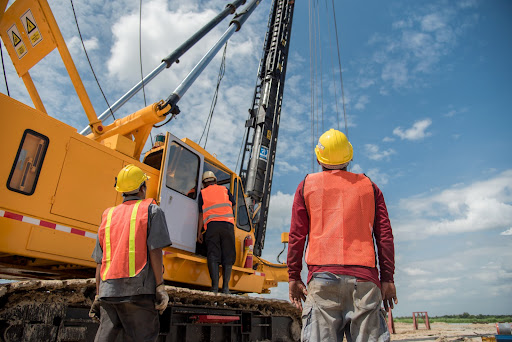You’ve got a job in the construction industry, and you need a crane. But how?
If you’re looking to hire a crane supplier, congratulations! From lifting construction supplies to materials and heavy machinery, cranes come in handy all over the construction industry.
So when you do have the need, you want to make sure you’re getting the perfect match. Fortunately, there are a few simple steps to consider beforehand. With this, you’ll have the right crane supplier for the job.
Read on to learn what to remember to choose a crane supplier for your next construction project.
Table of Contents
Understand Your Crane Needs
It is essential to understand first your crane needs. Identify what type of crane will best fit the job. As well as the weight capacity and size required.
Consider any special requirements. Such as power source, reach, and safety features.
Also, include any special attachments or features that you may require. It would help if you also considered the Gantry Crane types that best fit the environment. Such as a portable crane or adjustable crane.
Sit down with a crane consultant who can advise on the type of crane and accessories that suit your needs. Finally, pick a supplier who offers excellent value for money, affordable rates, and a quality crane fleet.
Understanding Their Technical & Service Expertise
A good crane supplier should know about a wide range of crane services. They also should understand the specific needs of the customer.
Companies should look for suppliers who are certified with quality management systems. They should have extensive experience and knowledge in the industry.
Ask questions about the supplier’s technical capabilities. Then ensure that the supplier has a good reputation for safety and timely delivery.
Additionally, check for service contracts that can help you in case of unexpected repairs or regular crane maintenance problems.
Evaluating The Quality & Availability of Cranes
Make sure that the supplier offers various cranes for different applications. Their machines should be up-to-date with the latest safety standards.
The supplier should also have a good safety record. They should utilize reliable and certified crane operators for all their jobs.
Additionally, evaluate the quality of their services and parts. This will give you a better sense of the supplier’s commitment to customer service.
Finally, finding a crane supplier that offers 24/7 customer support is essential. This is to ensure that any problems that arise can be quickly addressed.
Investigating Value-Added Services
Start by comparing quotes from different crane suppliers. Then look at the features of their product and services. See how the crane supplier can help streamline operations and reduce costs.
Next, look for value-added services. Such as post-delivery technical and safety consultation, 24-hour servicing, spare parts, and other cost-cutting support. Also, prioritize suppliers who offer product support and training resources.
Additionally, ask about any warranties that come with their products and services. Choosing a crane supplier with value-added services will save money in the long run. It ensures that you are getting the most for your investment.
Understanding Potential Delays & Other Risks
Consider the supplier’s history of meeting deadlines and ensure they provide realistic timelines. Ask the crane supplier if they take extra steps to ensure the safety of their workers. Such as providing training on proper crane setup and maintenance.
A good supplier should be able to provide a comprehensive safety plan. This includes safety measures such as fall protection, safe work practices, and regular equipment testing.
Additionally, inquire about the vendor’s financial security. This is in case there are any emergencies. Knowing the extent of their insurance coverage can give them peace of mind in an unforeseen event.
Finally, make sure to review any contractual agreements. This is to understand your obligations in case of delays or other risks.
Assessing Credentials and Qualifications
Start by discussing their background and experience with them. Ask if they have any special training or skills related to the job in volume and load capacity.
Learn about any certifications and accreditations they may have, and be sure to ask for proof. If their credentials don’t check out, move on to another company.
Additionally, you can ask for references from previous customers. Then find out how their experience went. Aside from reading online reviews, seek out the supplier’s website to learn more about them.
Look for the crane supplier’s safety record, which should include the appropriate safety training paperwork, such as licenses on/off-site. Be sure to check for any enterprise-level certifications, such as OHSA. There are also environmental regulations that a crane supplier must comply with.
Evaluating Flexibility and Customer Satisfaction
Consider things like the versatility of their products and services. Whether the supplier is open to working outside the scope of the initial agreed-upon order, Or whether it will be easy and hassle-free to change configuration or parts down the road.
Check reviews to learn whether they are responsive to customer questions, have a good turnaround time on delivery and installation, and have a good reputation for after-sales service. Also, consider the discounts they offer across different crane types.
Lastly, visit the supplier’s showroom. Review their catalog and get firsthand experience before making a decision.
Compare Costs and Payment Options
Ask questions about the additional costs before discussing the machinery and services cost. Make sure you understand the terms of the agreement. This ensures that you are both on the same page.
Ensure you get a quote that lists all costs, such as labor costs, set-up fees, and delivery charges. Depending on your budget, consider the financing options available.
Be aware of any included restrictions or exclusions in funding agreements. So you can plan your budget accordingly.
Some suppliers may have a better return policy. This could allow you to defer a scheduled payment or even receive a rebate or bonus. You should also consider the long-term cost savings of leasing the crane instead of buying it outright.
Choose a Crane Supplier Fit for Your Needs
Choosing a reliable crane supplier is critical to any successful construction project. Compare crane suppliers and consider price, reputation, location, service, and experience to find the best supplier.
You can make a well-informed decision about who to purchase from by utilizing the information listed here. Start browsing and comparing suppliers today to choose a crane supplier for your needs.
If you find this article helpful, check out our other blogs!





